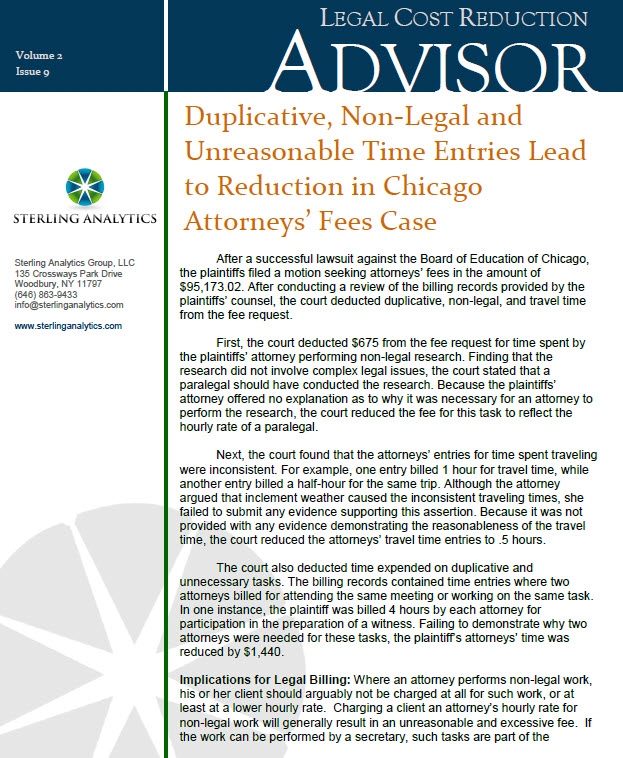After a successful lawsuit against the Board of Education of Chicago, the plaintiffs filed a motion seeking attorneys’ fees in the amount of $95,173.02. After conducting a review of the billing records provided by the plaintiffs’ counsel, the court deducted duplicative, non-legal, and travel time from the fee request.
First, the court deducted $675 from the fee request for time spent by the plaintiffs’ attorney performing non-legal research. Finding that the research did not involve complex legal issues, the court stated that a paralegal should have conducted the research. Because the plaintiffs’ attorney offered no explanation as to why it was necessary for an attorney to perform the research, the court reduced the fee for this task to reflect the hourly rate of a paralegal.
Next, the court found that the attorneys’ entries for time spent traveling were inconsistent. For example, one entry billed 1 hour for travel time, while another entry billed a half-hour for the same trip. Although the attorney argued that inclement weather caused the inconsistent traveling times, she failed to submit any evidence supporting this assertion. Because it was not provided with any evidence demonstrating the reasonableness of the travel time, the court reduced the attorneys’ travel time entries to .5 hours.
The court also deducted time expended on duplicative and unnecessary tasks. The billing records contained time entries where two attorneys billed for attending the same meeting or working on the same task. In one instance, the plaintiff was billed 4 hours by each attorney for participation in the preparation of a witness. Failing to demonstrate why two attorneys were needed for these tasks, the plaintiff’s attorneys’ time was reduced by $1,440.
Implications for Legal Billing: Where an attorney performs non-legal work, his or her client should arguably not be charged at all for such work, or at least at a lower hourly rate. Charging a client an attorney’s hourly rate for non-legal work will generally result in an unreasonable and excessive fee. If the work can be performed by a secretary, such tasks are part of the attorney’s hourly rate.
Moreover, inconsistent travel time to and from a particular place is highly suspicious. As demonstrated by this decision, large inconsistencies in travel time will be scrutinized and questioned. At the very least, an explanation as to why travel time increased on a particular trip should be provided in the billing records. Where evidence demonstrating the reasonableness of the inconsistent travel time is not presented, a court may eliminate or reduce the fee.
A general rule applied by many companies is that more than one attorney cannot bill a client for attending the same meeting or conference. However, where attendance of more than one attorney is necessary, an explanation is required. In this case, the billing records should have explained why more than one attorney’s participation was needed. Where no explanation is given, the participation of more than one attorney in a meeting is presumed to be unreasonable. This rule also applies to situations where multiple attorneys are working on the same task.
* Ryan M. v. Board of Education of the City of Chicago, 731 F. Supp.2d 776 (N.D. Ill. 2010). Full copies of court decisions may be available through counsel or through various Internet links or paid services.
By Laura R. Bugdin


